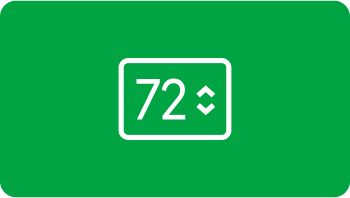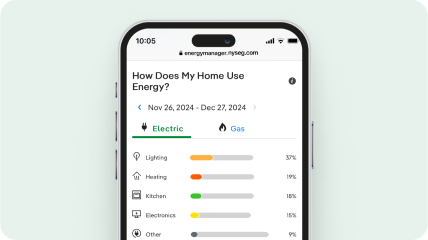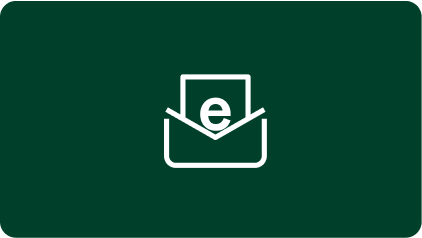
Hot days ahead, New York!
Check out our tips and tools for the warmer months. Learn how to manage your energy use and check safety tips.
How the warm weather affects your energy use
High temperatures may increase your electric and even your natural gas usage, which can have a major effect on your energy bill. Understand how it happens:
Hot weather means your air conditioner works longer to keep a comfortable temperature, which naturally raises electricity use. Your refrigerator and freezer also tend to use more energy during warmer weather.
Your cooling system may be the reason you are using more energy. Older equipment or systems lacking maintenance consume more energy. Heat pumps are efficient all-in-one heating and air conditioning. Check out our heat pump rebates and start saving energy.
During the summer months, we usually use more appliances like fans and pool pumps. This can have a big effect on your energy use, which reflects on your bill. Understand your needs and use your appliances wisely.
Clogged filters or vents force systems to work harder. Clean your filter once a month and vents once a year. It can also help with those annoying allergies!
Inadequate insulation lets hot air in and cool air out, increasing your energy consumption. Check your home for any leaks and our Home Insulation and Air Sealing Rebates to save on your annual energy use.
During spring and summer, the humidity is usually higher. Dehumidifiers or air conditioners work longer to remove moisture from the air, which can also increase energy use.
People tend to stay more at home during summer breaks or vacations, leading to an increased use of electronics, lighting and appliances. Tell your kids to turn off the video game and play outside!
If you are not brave enough to shower with cold water, you may end up using more natural gas or electricity by taking frequent showers during the heat season.
Electric supply may cost more when demand is high, like summer time (but remember: delivery rates won’t vary like that). Also some rates, like Time-of-Use (TOU) can see an even higher increase during this period. Learn more about our pricing and rates and look into your bill to check your current rate.
Tools to manage your use and bill
We offer tools to help you track your usage and control your bill
Vacation mode: on
Enjoy your summer worry-free with our digital tools
Tips to reduce energy use
A few simple tweaks can make a big difference in your usage
Set your air conditioning to 78° or higher during summer time. Each degree above 75° saves you approximately 3% of the energy used to cool your home.
Whenever you’re not home turn up the temperatures, unless you have a heat pump. With a programmable thermostat, you can do it anytime and anywhere. Check our selection on the Smart Solutions website.
Look for and seal any leaks in your ductwork.
Roll up a small rug or towel and place it across the bottom of your door or windows to prevent cold air from sneaking out.
Close air conditioning vents in rooms you’re not using during the season. Concentrate cool air where you actually need it.
Newer cooling systems can help you save on energy. We offer heat pump rebates to help you take this step. Check to see if a heat pump is a good choice for you.
Whenever possible, use natural light instead of turning on electrical ones. To avoid the heat, open the curtains in the morning or late afternoon, when sunlight is less intense or in rooms that don’t get direct sunlight, like north-facing windows.
It seems opposite of the tip above, but they can work together. Close the curtains during peak sunlight hours and in west and south-facing windows. Use sheer curtains to diffuse light while blocking heat. Open blinds angled upward to let in light but reflect heat. Consider thermal or reflective curtains that reduce heat gain while still allowing some light.
If you are not in the room, turn off fans and while you’re at it, turn off the lights as well!
Opening the refrigerator or freezer door for long periods lets all the cold air out, making the compressor work longer to maintain temperatures. Think about everything you want from them before opening the door. Same goes for the oven—use the window to check your food instead of opening the door all the time!
Letting your laundry air-dry on a clothesline or drying rack uses zero electricity and reduces wear and tear on your clothes. It’s an easy way to cut down on energy use!
We offer different rates that may suit your consumption pattern better. Check our electric pricing and rates page and understand if you should migrate for a better option.

Upgrade to energy-efficient products!
Explore NYSEG Retail Products Program to purchase energy-saving products and take advantage of instant discounts exclusively for our customers.

How can we help?
We understand that managing energy bills during such a hot summer can be challenging. If you need additional support, we offer a variety of assistance programs designed to help. Visit our Help with Bill page to learn more.
Summer safety tips
From thunderstorms to digging, learn what to do to keep you and your family safe.
Many of us decide to remodel or plant trees during the warmer season. But you can risk hitting and damaging underground utilities pipes and cables. Work with UDig NY to have them mark underground utility facilities, so you can dig safely.
Keep a safe distance from power lines and never touch cables with any part of your body. This includes during vegetation trimming, fireworks and flying kites or drones.
Never allow any type of electric wires or power cables (including your phone charger!) to cross or be near any body of water. If you have pools, be sure all electrical connections to pools and tubs are grounded. Connections that aren’t grounded can lead to electrical shock. Have ground fault circuit interrupter (GFCI) outlets installed for any outlets near water. These highly sensitive outlets quickly detect changes in electrical current.
Imagine this: you are barbequing, a big fan is on, your speaker is playing music and it’s time to charge your phone. During summer, we tend to use more appliances, but be careful to not overload your outlets. Power strips can be a safer and efficient solution.
We know being outside is great! But make sure you are using outdoor-rated equipment when you are outside and use battery-operated electrical devices outside whenever possible.
Stay away from objects that conduct electricity, such as metal fences. If you see a downed power line, stay away and call 911 or 800.572.1131. If your basement or home floods, the first thing you should do is to turn off your electricity - if it’s safe to do so, otherwise, call 911.
If you suspect a natural gas leak, get up, get out and get away! Then call us immediately at 800.572.1121 or 911 from a safe location.






